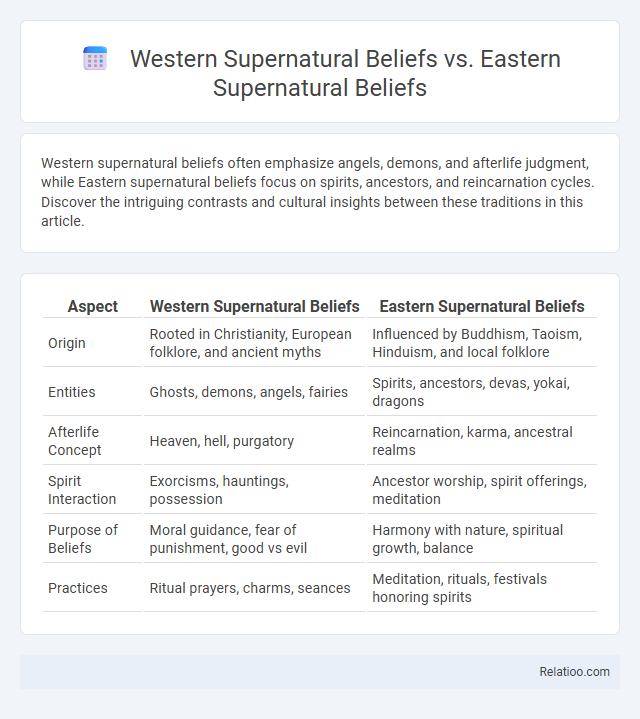Western supernatural beliefs often emphasize angels, demons, and afterlife judgment, while Eastern supernatural beliefs focus on spirits, ancestors, and reincarnation cycles. Discover the intriguing contrasts and cultural insights between these traditions in this article.
Table of Comparison
| Aspect | Western Supernatural Beliefs | Eastern Supernatural Beliefs |
|---|---|---|
| Origin | Rooted in Christianity, European folklore, and ancient myths | Influenced by Buddhism, Taoism, Hinduism, and local folklore |
| Entities | Ghosts, demons, angels, fairies | Spirits, ancestors, devas, yokai, dragons |
| Afterlife Concept | Heaven, hell, purgatory | Reincarnation, karma, ancestral realms |
| Spirit Interaction | Exorcisms, hauntings, possession | Ancestor worship, spirit offerings, meditation |
| Purpose of Beliefs | Moral guidance, fear of punishment, good vs evil | Harmony with nature, spiritual growth, balance |
| Practices | Ritual prayers, charms, seances | Meditation, rituals, festivals honoring spirits |
Origins of Western and Eastern Supernatural Traditions
Western supernatural beliefs originate primarily from Greco-Roman mythology, Judeo-Christian theology, and medieval European folklore, emphasizing concepts like angels, demons, and divine intervention. Eastern supernatural traditions root themselves in ancient philosophies such as Taoism, Hinduism, and Buddhism, highlighting spirits, karma, and ancestral reverence. These foundational differences reflect distinct cultural evolutions in understanding the unseen world and supernatural phenomena.
Core Differences in Worldviews
Western supernatural beliefs often emphasize individualism, with a focus on personal salvation and dualistic concepts of good versus evil. Eastern supernatural beliefs tend to stress harmony, interconnectedness, and cyclical understandings of life and spiritual forces. Your worldview influences how supernatural phenomena are interpreted, ranging from external intervention by deities in the West to internal balance and enlightenment in the East.
Gods, Spirits, and the Afterlife
Western supernatural beliefs often emphasize monotheistic gods, with an afterlife that includes heaven or hell based on moral judgment, while spirits are frequently viewed as angels, demons, or saints. Eastern supernatural traditions tend to feature polytheistic or pantheistic gods, ancestor spirits, and concepts like reincarnation or karma influencing the afterlife cycle. Supernatural beliefs globally reflect diverse understandings of gods' roles, the presence of spirits, and afterlife interpretations shaped by cultural, religious, and philosophical contexts.
Magic and Ritual Practices
Western supernatural beliefs emphasize ritual magic rooted in Hermeticism and occult traditions, often focusing on individual power and symbolic tools like tarot and alchemy. Eastern supernatural beliefs integrate magic and rituals within spiritual frameworks like Taoism, Shinto, and Hinduism, emphasizing harmony, ancestor worship, and energy manipulation such as Qi or Prana. Both traditions utilize ceremonies and chants, but Western practices lean toward formalized spells, while Eastern rituals prioritize flow and balance with natural forces.
Role of Mythology and Folklore
Western supernatural beliefs often draw heavily from Greco-Roman and Judeo-Christian mythology, emphasizing angels, demons, and divine intervention as core elements. Eastern supernatural beliefs, influenced by traditions like Hinduism, Buddhism, and Shinto, incorporate spirits, ancestors, and karmic forces deeply rooted in mythology and folklore. Your understanding of supernatural phenomena is enriched by recognizing how mythology and folklore shape interpretations of the spiritual world differently across cultures.
Influence of Religion and Philosophy
Western supernatural beliefs are deeply influenced by Judeo-Christian traditions, emphasizing divine intervention, angels, and demons tied to moral dualism. Eastern supernatural beliefs often integrate Hinduism, Buddhism, and Taoism, focusing on karma, spirits, reincarnation, and ancestral worship with a cyclical worldview. The influence of religion and philosophy shapes these beliefs distinctly, with Western views grounded in linear time and salvation, while Eastern perspectives embrace harmony and spiritual enlightenment through continuous cycles.
Superstitions and Everyday Life
Western supernatural beliefs often revolve around Christian-influenced superstitions such as the evil eye, lucky charms like horseshoes, and rituals to ward off misfortune, deeply integrated into daily practices. Eastern supernatural beliefs, particularly in cultures like Chinese and Indian, emphasize ancestral spirits, feng shui, and karma-driven rituals that influence household arrangements and daily decisions. Supernatural beliefs globally shape everyday life through rituals, taboos, and symbols aimed at protection, fortune, and spiritual harmony, reflecting cultural values and existential interpretations.
Representations in Art, Literature, and Media
Western supernatural beliefs often manifest in art, literature, and media through motifs of angels, demons, and haunted landscapes, reflecting Judeo-Christian influences and exploring themes of good versus evil. Eastern supernatural representations frequently feature spirits, ancestors, and mythological creatures, emphasizing harmony with nature and spiritual balance in traditional ink paintings, folklore, and contemporary films. Your understanding of supernatural beliefs can be enriched by recognizing these cultural nuances and how they shape visual and narrative storytelling worldwide.
Interactions and Syncretism between East and West
Interactions between Western and Eastern supernatural beliefs have fostered rich syncretism, blending concepts like Western angels with Eastern kami and yin-yang energies. Your understanding of supernatural phenomena expands through the fusion of Christian spiritualism and Eastern mysticism, creating new hybrid practices in global spirituality. This cross-cultural exchange emphasizes shared themes of divine intervention and ancestral reverence, highlighting the fluidity of supernatural belief systems across cultures.
Contemporary Perspectives and Globalization
Contemporary perspectives on Western supernatural beliefs often emphasize individualism and psychological interpretations, while Eastern supernatural beliefs tend to integrate spirituality with communal harmony and traditional practices. Globalization facilitates the blending of these beliefs, allowing Your understanding to expand through exposure to diverse rituals, deities, and cosmologies. This cross-cultural interaction reshapes supernatural beliefs by merging scientific skepticism with ancient wisdom across the world.

Infographic: Western Supernatural Beliefs vs Eastern Supernatural Beliefs
 relatioo.com
relatioo.com